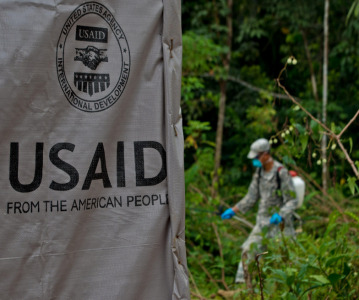New vaccine technology utilising weakened DNA viruses
.png)
A new method of vaccine technology that employs weakened viruses has been developed to target DNA viruses that reproduce by making copies of their own DNA molecules, utilising a virus with altered DNA to fight against them.
Scientists at Rutgers have developed what has been termed a ‘DNA vaccine’ - a live-attenuated, replication-defective DNA virus vaccine that utilises centanamycin to generate an altered virus in stopping viral infections.
The vaccine functions by producing an attenuated version of a mouse cytomegalovirus, which has been rendered so it cannot reproduce or replicate within a cell. Because of its inability to replicate, the virus is restricted to its site of administration as it cannot produce infectious viral material. Researchers discovered that when injected into animals, the weakened viral particles stimulated a host’s immune system into recognizing the particles as foreign, producing an immune response that eliminates the virus when detected.
“We have found that this method is safe – the attenuated virus infects certain cells without proliferating beyond that, and alerts the host to produce specific neutralising antibodies against it,” commented Dabbu Jaijyan, a researcher at Rutgers New Jersey Medical school. “We see this as a novel method that we hope will accelerate vaccine development for many untreated viral infections in humans and animals.”
Because the vaccine specifically targets DNA viruses such as cytomegalovirus, chicken pox, and herpes – viruses that make copies of their DNA molecules to reproduce – the vaccine method has been termed a live-attenuated DNA virus vaccine as it uses an altered DNA virus against the infections. The method is capable of quickly generating live-attenuated viruses that cannot replicate, and could potentially accelerate vaccine development for DNA virus diseases. In mice studies, researchers at Rutgers demonstrated that the method was effective against several DNA viruses, including both human and mouse cytomegalovirus and herpes simplex virus 1 and 2. While not all viruses replicate through DNA copying (such as SARS-CoV-2, which replicates through its RNA), this vaccine method works for DNA viruses as the viral particles are treated with a DNA-binder. The binder latches onto any organism’s DNA, including the viral DNA, and blocks reproduction.
When testing the method against cytomegalovirus, the team purified samples of the virus grown in their lab and bathed them in centanamycin. This mixture was injected into mice but the weakened virus that infected the cells did not spread. The mice’s immune system then produced antibodies to eliminate the virus and prevent infection. Cytomegalovirus is a common virus for individuals of all ages, however those who are immunocompromised and organ transplant patients can suffer severe symptoms. The virus can be spread through bodily fluids and is the leading cause of birth defects in newborns through congential infection.
Researchers hope to eventually test the method on humans, as well as model test for other medically important viruses.
“One of the major advantages of our technology is the safety offered by the robust inhibition of virus replication and that no progeny viruses are produced... Our technology can be easily applied to any DNA virus to generate live-attenuated replication defective viruses for vaccine development,” Jaijyan stated.
Source: Rutgers Scientists Produce “DNA Virus Vaccine” to Fight DNA Viruses | Rutgers University
Related News
-
News US FDA adds haemodialysis bloodlines to devices shortage list
On March 14, 2025, the US FDA published an open letter to healthcare providers citing continuing supply disruptions of haemodialysis bloodlines, an essential component of dialysis machines. -
News Women in Pharma: Manufacturing personal and team success
Our monthly Women in Pharma series highlights the influential lives and works of impactful women working across the pharmaceutical industry, and how the industry can work towards making the healthcare industry and workplace more equitable and inclusive... -
News Pfizer may shift production back to US under Trump pharma tariffs
At the 45th TD Cowen annual healthcare conference in Boston, USA, Pfizer CEO Albert Bourla outlined the potential for Pfizer to shift its overseas drug manufacturing back to the US as pharmaceutical industry players weigh their options against Presiden... -
News Experimental drug for managing aortic valve stenosis shows promise
The new small molecule drug ataciguat is garnering attention for its potential to manage aortic valve stenosis, which may prevent the need for surgery and significantly improve patient experience. -
News Women in Pharma: Connecting accessible pharma packaging to patients – a Pharmapack Special
Throughout our Women in Pharma series, we aim to highlight how CPHI events encourage discussions around diversity, equity, and inclusion initiatives in the pharmaceutical industry. -
News Vertex Pharmaceuticals stock jumps as FDA approves non-opioid painkiller
UK-based Vertex Pharmaceuticals saw their stock shares soar as the US FDA signed off on the non-opioid painkiller Journavx, also known as suzetrigine, for patients with moderate to severe acute pain, caused by surgery, accidents, or injuries. -
News Trump administration halts global supply of HIV, malaria, tuberculosis drugs
In various memos circulated to the United States Agency for International Development (USAID), the Trump administration has demanded contractors and partners to immediately stop work in supplying lifesaving drugs for HIV, malaria, and tuberculosis to c... -
News 2024 Drug Approvals: a lexicon of notable drugs and clinical trials
50 drugs received FDA approval in 2024. The centre for biologics evaluation and research also identified six new Orphan drug approvals as under Biologics License Applications (BLAs). The following list picks out key approvals from the list, and highlig...
Recently Visited
Position your company at the heart of the global Pharma industry with a CPHI Online membership
-
Your products and solutions visible to thousands of visitors within the largest Pharma marketplace
-
Generate high-quality, engaged leads for your business, all year round
-
Promote your business as the industry’s thought-leader by hosting your reports, brochures and videos within your profile
-
Your company’s profile boosted at all participating CPHI events
-
An easy-to-use platform with a detailed dashboard showing your leads and performance







